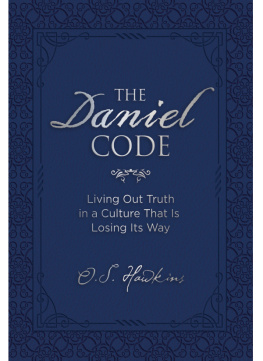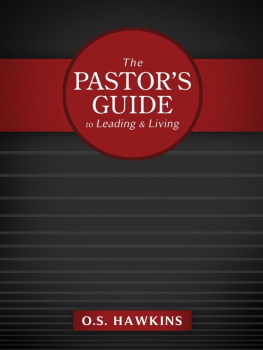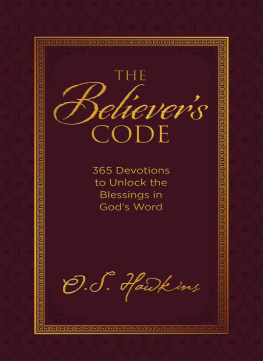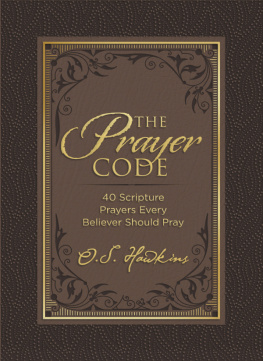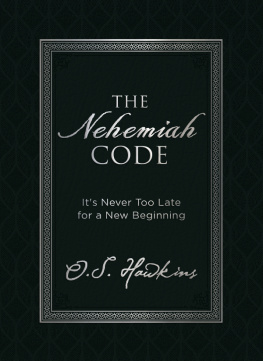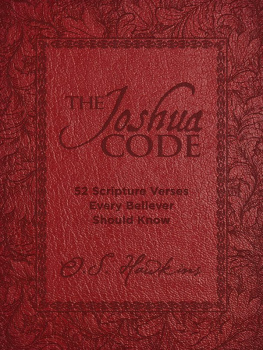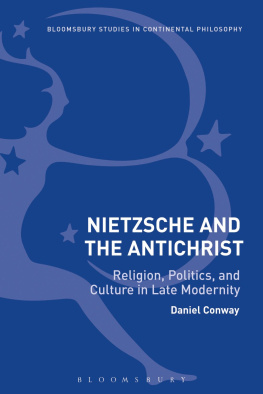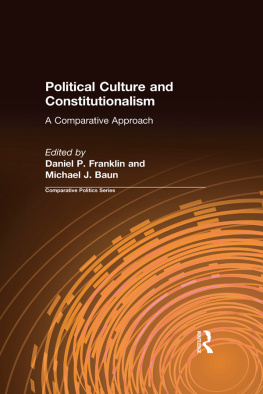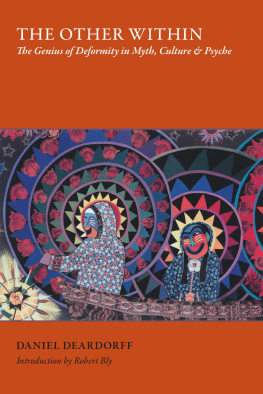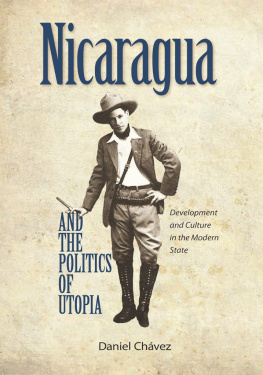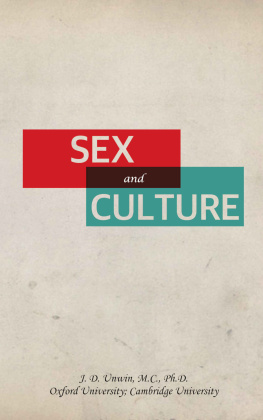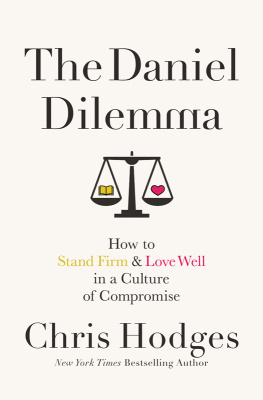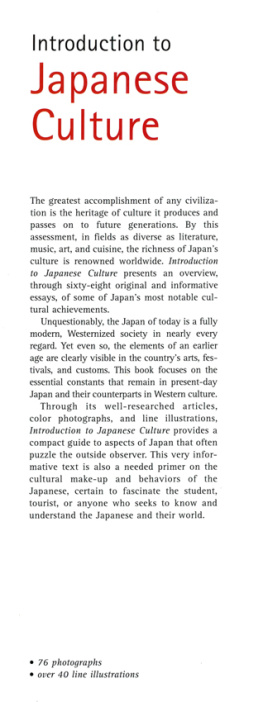TO
FROM
OCCASION
The Daniel Code
2016 by O. S. Hawkins
All rights reserved. No portion of this book may be reproduced, stored in a retrieval system, or transmitted in any form or by any meanselectronic, mechanical, photocopy, recording, scanning, or otherexcept for brief quotations in critical reviews or articles, without the prior written permission of the publisher.
Published in Nashville, Tennessee, by Thomas Nelson. Thomas Nelson is a registered trademark of HarperCollins Christian Publishing, Inc.
Cover design by Left Coast Design, Portland, Oregon. www.lcoast.com
Thomas Nelson titles may be purchased in bulk for educational, business, fund-raising, or sales promotional use. For information, please e-mail SpecialMarkets@ThomasNelson.com.
Unless otherwise noted, Scripture quotations are taken from the New King James Version. 1982 by Thomas Nelson. Used by permission. All rights reserved.
Scripture quotations marked ESV are taken from the ESV Bible (The Holy Bible, English Standard Version). Copyright 2001 by Crossway, a publishing ministry of Good News Publishers. Used by permission. All rights reserved.
Scripture quotations marked NIV are taken from the Holy Bible, New International Version, NIV . Copyright 1973, 1978, 1984, 2011 by Biblica, Inc. Used by permission of Zondervan. All rights reserved worldwide. www.zondervan.com. The NIV and New International Version are trademarks registered in the United States Patent and Trademark Office by Biblica, Inc.
978-0-7180-8994-8
ISBN 978-0-7180-8567-4 (eBook)
16 17 18 19 20 WAI 6 5 4 3 2 1
I love the words of Daniel 1:21, which say, Thus Daniel continued...
The Daniel Code is dedicated to all those faithful servants who continued to minister with dedication and determination in those out-of-the-way places where they often wondered if they had been forgotten. They lived on meager pastors salaries with little extra to put aside for their declining years. Since all the authors royalties and proceeds from The Daniel Code go to support them, you have had a part in being Christs hand extended by purchasing this book. Mission:Dignity is here to enable these faithful pastors, their wives, and their widows to live out their final years with the kind of security and dignity they so richly deserve.
A s I type the words culture shock, my mind is racing back over the decades of my life. Flashing before me are the many changes I have personally witnessed in the cultural collapse of the Judeo-Christian ethic of our Western world in my lifetime.
I was born in 1947 and spent my boyhood days in the 1950s, when tens of thousands of American troops had just returned home from Europe and the South Pacific at the conclusion of World War II. They married their high school sweethearts, and what sociologists have termed the baby boom began. In the 1950s, we were a grateful and thankful people. Average church attendance was at an all-time high. We never locked our doors at night. I left my bicycle in the front yard every evening, and it was always still there the next morning. We heard Bible readings each morning over the intercoms of our public elementary schools. The Ten Commandments were prominently displayed on the classroom walls, and once a year some good and godly folks called the Gideons visited our school and gave every student a copy of the New Testament. As always happens, the mood of the culture was reflected in the music of the day. Doris Day had one of the biggest hit songs of the era in Que Sera, Sera (Whatever Will Be, Will Be). It was a new day of optimism and hope.
C HANGE I S IN THE W IND
Then came the 1960s. I have always felt a bit sorry for those folks who didnt get to spend their teenage years in the golden oldie days of the 60sthe days of madras Windbreakers, Bass Weejun shoes, glasspack mufflers, and sock hops. But in sharp contrast were certain events that did something to the psyche of our nation: the assassination of President John F. Kennedy in 1963 and our entrance into the Vietnam War. We shifted from the more innocent and optimistic white-picket-fence mentality of the 50s to one that became extremely introspective. Once again the culture was reflected in the music. Peter, Paul and Mary had one of the biggest hits of that decade when they sang, The answer, my friend, is blowing in the wind. Many Americans realized that the answers they thought they had were simply blowing in the wind. The culture became immersed in introspection.
Next came the 1970s, the decade of such traumatic events as Watergate and the resignation of a president, the legalization of abortion in Roe v. Wade, and ongoing involvement in Vietnam. I watched as the culture moved from one that was introspective to one that became extremely skeptical. Skepticism influenced the mind-set of millions, and it showed up in the music. Billy Joel, the piano man, had one of the biggest hit songs of the 70s when he sang, Only the good die young. Skepticism in a nutshell.
Then came the 1980s, and Ronald Reagan spoke of the United States as that shining city on a hill. The economy grew, and new hope permeated the fabric of our national pride. Then we saw the Berlin Wall come crashing down on the other side of the Atlantic, an international event that fueled hope in our nation
In the 1990s, the USSRthe evil empirecollapsed, and the Cold War came to an end. This was followed by the start of a new millennium, and a horrific event in the first decade of the twenty-first century scarred the psyche of our nation. The infamous 9/11 attack on America changed profoundly the way we think and go about our everyday lives.
A ND H ERE W E A RE T ODAY ...
So my own grandchildren are growing up today in a culture where issues that slithered down the darkened back alleys of my childhood now parade themselves proudly down the main streets of every city and town in America. We have watched an entire culture slowly but surely sink into a moral malaise of unfathomable proportions. How can we believers and our faith in Jesus survive in our modern, counter-Christian-cultural world?
We arent the first followers of God to face this situation. The Old Testament hero Daniel wrote the book on how Gods people can survive in a pagan, permissive, and perverted culture. He was born in Jerusalem and grew up there until he was taken captive to Babylon as a young man. He found himself uprooted from a Jewish culture built upon the Mosaic moral law and dropped into one that was foreign to everything he had known and been taught. His value system, his truth claims, and his moral compass were all challenged repeatedly. Overnight, his world had become one of pluralism and paganism. Daniel could have spent his energy blaming his circumstances on societal ills, the court system of his day, government policies, political leaders, or the educational system, just as we Christians in our contemporary culture can place blame today. However, Daniel steps off the pages of Scripture and into our modern culture to reveal some principles, a sort of Daniel Code, that can enable us not to simply survive in our culture but to engage it, thrive in it, and even be used by the Lord to transform it.
A B ELIEVER S O PTIONS
Can we really expect to change a culture that is crumbling around us? I absolutely believe so, but it is interesting to observe the various ways in which people of faith address the culture today. There are those who compromise: they accept cultural ideasincluding the call to tolerancethat subtly shift their allegiance away from following Christ and Him only. Some believers

